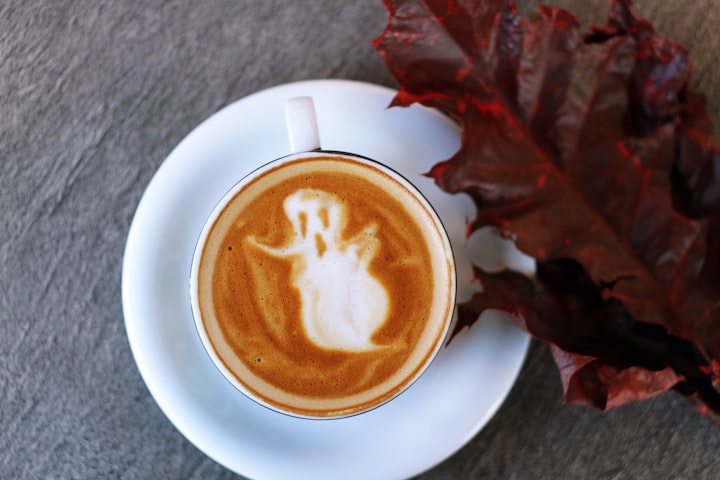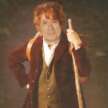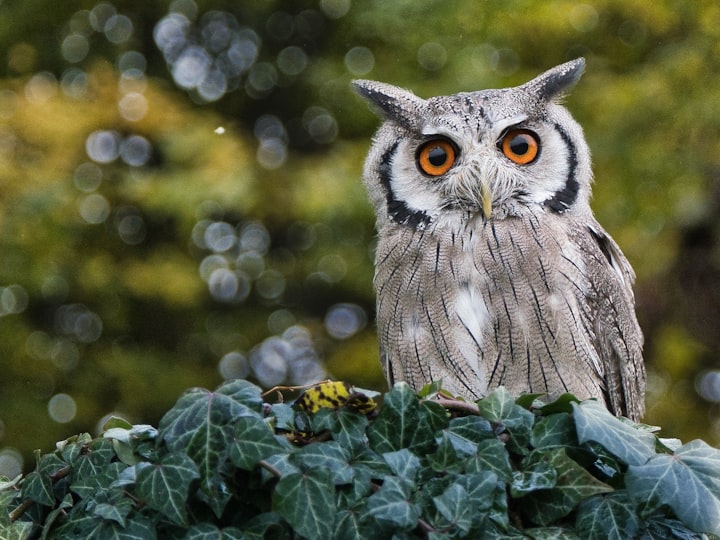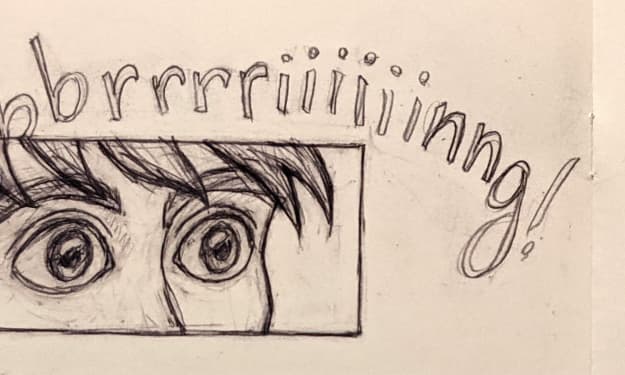Island of the Loons
a campfire ghost story

I rented a canoe on Rainy Lake and began to paddle out and back into time; a time when few white people came to the region.
The sound of the paddle and the bow parting the water left no trace of the world I left behind. Only the reflection of trees along the shoreline broke my meditation.
I paddled in the direction of a yodeling loon.
About an hour out I was turning to head back when I noticed a plume of smoke. My curiosity drew me around a rocky point, where I saw an elderly woman chopping wood outside of her tiny cabin.
The smoke was rising from the stack of a wood-burning stove.
I pulled the canoe up on her shore and she paid me no mind. The ax swung and the logs split. Her snow-white hair was tied back under a red-and-black, checkered lumberjack hat.
“Good afternoon, Ma’am,” I interrupted.
She set the ax down, “If you’re looking for money, young man, I ain’t got none and never will. That was the Lord’s plan. I ain’t gonna argue with the Lord. So, you best be moving on.”
She spit into her bony, vein-covered hands, picked up the ax, and proceeded to add to her pile of cut timber.
I looked around and saw a fishing pole and tackle propped against the cabin. Snare traps hung by hides drying in the sun.
Behind a tree stood an outhouse and fish-cleaning hut. She was a woman of pioneer spirit.
The years of swinging that ax could be seen in her hunched back. Her gnarled, muscular limbs bent by the endless winter wind. The skin on her face resembled the cracks of early spring lake ice. She sniffed the air with a short owl-like nose. Her sharp, marble-black eyes could spot even the smallest fly hovering above her latest catch.
Stories of dog mushing, snowshoeing, and wilderness survival emanated from a proud carriage shown in her jutting jawline. She had all the signs of a person who had embraced solitude and found solace as a lone hunter.
I stood there silent, not sure of what rebuttal might work on her.
“Well don’t stand there with a heavy lip, or a crow’s gonna do its morning chore on your head,” she sputtered.
“How long have you lived here?”
“As long as I can remember,” she paused to spit again. “All right, young man, it seems you have a hankering for words so let’s go inside and I’ll pour you some coffee.”
She opened her heavy pine door and limped inside.
Her one-room cabin had a wood-burning stove, a cot, old black-and-white photos, deer antlers, a night bucket, a table with two chairs, dishes, and clothes hung on a wire in one corner.
The interior was adorned with hundreds of amazing little hand-carved wooden loons.
She served me coffee in a loon-shaped mug.
“What are you doing on the lake?” she quizzed me.
“I sell insurance and wanted to take a break, ma’am,” I answered, “My name is Arlo… what is your name?”
“My name is Marie Oberholtzer. Where you from, young man?”
“From the cities."
“How about your kin?” She picked up a knife and a block of wood and began to carve the beginnings of a loon. Her fingers were long and curved at the knuckles like a spider crab.
“Abandoned when I was 15 years old,” I told her.
“Why was that, pray to tell?” her eyes fixed hard on me.
“My parents and I didn’t see eye to eye on things, I guess,” I replied, shrugging my shoulders.
“Your mother was a farmer?” she delved.
“Yes and my dad was a salesman,” I added.
“Yep, you’re stubborn like your mother. Stubborn as all get out, you crazy farmers,” she proclaimed while shaking her head. “So your daddy was a traveling salesman like you, eh?”
She knew I was telling a bit of a lie.
“There are enough orphans in the world without wanting to be one. You’re old enough now to know better. Someday, your parents will be gone, and then what?” she scolded.
“What about you, Marie? Where did your kin come from?” I asked.
“I was born on a ship crossing the Great Lakes in the late 1800s. My parents settled these parts for timber and hide. Then in the winter of 1890, the pox killed my parents, sister, and brother. Only my father’s uncle’s son survived. And so it is with the Lord’s plan. No sense in questioning it… gonna do no good.”
“How do you survive up here?”
“I knew Ojibwe trappers and learned their medicine. I would have died without their help. The Ojibwe says that this is the lake that speaks. When I was young the Indians called me zazegaa-ikwe agamiing. It translates roughly to mean Lady Out of the Lake. Like, I was born on the lake. Billy Maggie and his tribe, my cousin, they’re gone.
Amen, mercy on their souls.
Once the lake has frozen a neighbor stops by and brings me supplies on a snowmobile. If it’s not too cold, I’ll snowshoe over to Mallard Island. Have you been to my cousin’s island? He built quite the museum there. From here, it’s about 15 minutes by canoe.”
The coffee was lumberjack-boot strong- so strong I could cut her winter firewood in one hour.
“Can I lend a hand with your firewood?”
“I would appreciate that young man."
I split wood for an hour and stacked it beneath a tarp.
She offered a drink of the cool spring water and I sat down to admire her loons. “You’re a great woodcarver. Do you make anything else besides loons?”
“Nope, I only do loons. They’re my specialty,” she replied.
“Do you sell them?”
“I give them away as gifts,” she told me.
“Do you have any insurance?”
“Never been to a doctor and never will, it’s the Lord’s plan,” she said, as she sanded the head of her new loon.
“I’d like to give you a life insurance policy. Consider it a gift. The policy will pay out $3,000 to your choice of beneficiary. All I need is your birth date.”
“Oh, you mean when I die someone’s gonna get $3,000?” she acted surprised.
“Yes, who would you like the money to go to?”
“Can I donate it to the Lake of the Woods Ojibwe band?” she asked.
“I will have to find out how to register that,” I answered.
“Okay, what do you need to know from me?”
“What is your birth date?”
“My birth date is January 2, 1884. I am 92 years old,” she said while inspecting her new carved loon.
I lied on all the underwriting questions about her health.
“Sign here.”
Without looking I closed my underwriter’s kit. “Great, thank you. And someday I am sure the Ojibwe people will appreciate it, too.”
“I have something for you,” she said with a smile, as she handed me the small loon she had carved.
“Thank you, Marie,” I said and put it into my pocket, “It’s getting late so I should be getting back.” I stood up and gave her a bear hug. “Don’t get too lonely out here.”
I watched her silhouette fade on the shoreline.
When I arrived back at the outfitters, the resort owner asked me about my trip, “How was your voyage?”
“It was great,” I said. “I came upon this cabin where I met an elderly woman named Marie -The Lady of the Lake.”
He stood there expressionless as I told him a fish as big as my canoe capsized me.
“Come with me,” he welcomed, motioning to his bar.
I sat at his bar and looked at a map of the lake on the wall with a bunch of pins stuck in it with dates at various locations. I assumed they were camping spots.
“What can I get you?” he offered while wiping off the bar top. “You must be thirsty after all that paddling.”
I had made my sales quota and I supposed I earned the right to celebrate. “I will have a beer on tap.”
The resort owner set the beer down in front of me. It was golden brown with frosty foam on top. I took a good gulp.
“So, what’s this you say about meeting an elderly woman on an island?” he asked.
“She was a 92-year-old lady who carved loons,” I replied, then downed my beer.
“Can you point on the map where you saw her?” he asked.
I got up from my barstool, and, to my best estimate, pointed to an island on the map, and said, “Right about there.”
He looked at the spot, stuck in a pin, and wrote the date.
“The sightings go back at least 50 years to when I opened this resort,” he told me.
“No one knows how long before that. The last sighting was 10 years ago. A fisherman told me how they came across an old woman living alone in the wilderness.
According to Indian legend, there was a female loon that got stuck in an early winter storm. Unable to fly, she died on an island. The spirit of the loon lives in the Lake that Speaks. What did she tell you, son? The stories vary. She doesn’t appear to anyone.”
The story left me dumbfounded. I thought he was pulling my leg. “I wrote her a life insurance policy,” I said.
“That’s a shiner if I ever heard one,” he laughed. “I don’t suppose you got her signature?”
“I did.”
I pulled out my underwriter’s kit and flipped through the policies to the last one. I looked in disbelief and the signature line was blank.
“How about a beer on the house?” he offered, laughing again.
“But she said she was the cousin of the person who built on Mallard Island,” I questioned.
“Oh, that’s a new one,” he said and poured me another beer.
I thanked the resort owner and started my drive back to the motel where my insurance team was staying.
That’s when I noticed a sharp object in my pocket. I pulled it out and it was a small wooden loon.
About the Creator
Arlo Hennings
Author 2 non-fiction books, music publisher, expat, father, cultural ambassador, PhD, MFA (Creative Writing), B.A.






Comments
There are no comments for this story
Be the first to respond and start the conversation.